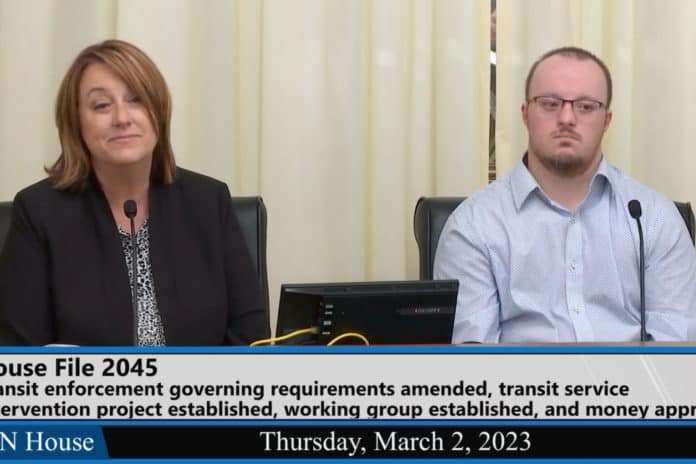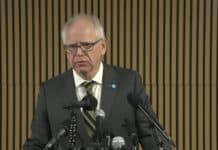
Metropolitan Airports Commission associate vice president Mitch Kilian told lawmakers last week that the amount of “open drug use” on the Metro Transit system is “just incredible.”
“And it’s not marijuana use. It’s crack and things like that. Open pipe smoking right in the open next to our passengers is a very regular occurrence for us,” he said.
Kilian testified Thursday in support of a bill to address the deteriorating conditions on Metro Transit’s light rail, which connects the two terminals at the Minneapolis-St. Paul International Airport.
“The testimony that you heard today, we are regularly hearing those stories at the airport, from our employees and passengers that ride the light rail,” Kilian said. “The increase since 2018 is enormous on the number of complaints and safety issues.”
Rep. Brad Tabke, DFL-Shakopee, is sponsoring the bill that would implement an immediate “three-month intensive intervention program” to help reset the culture on light rail, he said.
Tabke said he’s been forced to use Metro Transit to commute to the Capitol for the past two months because of car troubles.
“We have a massive, massive problem and we need to take action,” he told the House Transportation Finance and Policy Committee.
This “intervention program” would consist of social services teams to help riders with housing or mental health and drug abuse issues.
According to a House research summary, the bill would appropriate $1 million from the general fund to the Metropolitan Council to cover the costs of the intervention project.
Several Minnesotans testified before the committee about their experiences with crime on Metro Transit.
Aiden Kilgannon, 28, who has Down Syndrome, said a woman wearing nothing but a towel hit him in the side of the head and spit in his face while he was taking the Blue Line to work in February.
“I need it to be safe,” he said.
David Peterson lives in Minneapolis and regularly commutes to St. Paul for work using the light rail. He said the state of the light rail system is “shocking.”
“The drug use is out of control. There are fentanyl wrappers all over the floor of the train,” he said.
Ryan Timlin, president of the local transit union, said that at the Lake Street station, “you can look down the elevator shaft and see it’s full of needles.”
He said he has one member who is on leave because “they defended themselves.”
“If they hadn’t defended themselves, I think we may be talking about a death today,” Timlin explained. “We have bus operators who are suffering from PTSD and are not getting the assistance they need.”
A bus stop in north Minneapolis near Merwin Liquors became a “drug haven.” When his members reached out to the Met Council for help, it was “falling on deaf ears,” he said.
“The responses we were getting were about equity,” he said. “To use equity and spin it on its head, we need to rethink how we use some of our terms.”
Crime Watch Minneapolis reports on a drug overdose on the Metro Transit system on a near daily basis. Crime reports were up 54% last year for the Metro Transit system compared to 2021.
Overdose at the Metro Transit Lake St LRT station.
North elevator lobby, upper level
2310 E Lake St
11:50— CrimeWatchMpls (@CrimeWatchMpls) March 3, 2023
Rep. John Petersburg, R-Waseca, criticized Met Council Chair Charlie Zelle for allowing the issue “to escalate to this particular level.”
“The accountability really lies with you. The legislature is trying now to fix it for you. This is really an issue where the Met Council has dropped the ball and allowed it to escalate,” he said.
Zelle said the Met Council takes full responsibility but claimed that if they had “not taken steps starting three years ago, it might have actually been worse.”
Zelle also revealed that the Metro Transit Police Department is down to about 107 full-time officers, with an authorized strength of 171.
“I hate to say it, but I think this bill is only the first step as to the work we have to do,” Kilian said.
The transportation committee plans to hear additional testimony before voting on the bill.









